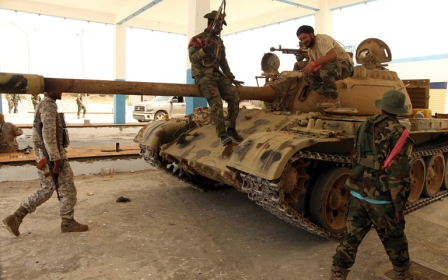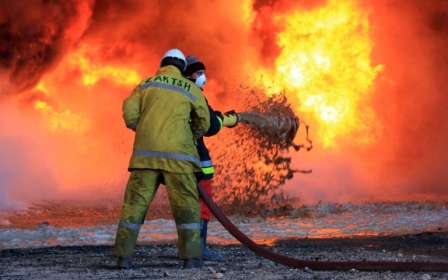Cash-strapped IS sells chickens and eggs to raise funds in Libya

Libya’s economic crisis is hitting the Islamic State (IS) group, forcing fighters to sell chickens and eggs in the streets, and reintroduce withdrawn Gaddafi-era banknotes to shore up their finances.
According to former residents from the IS stronghold of Sirte, militants have implemented rental and taxation systems, with a side-line in poultry.
“When IS took over Sirte, they seized many properties, including farms, and some of these are very large chicken farms,” one former resident, Ali, told Middle East Eye.
“Relatives tell me IS people can now be seen standing in the streets in their black outfits with their faces covered, selling both the eggs and the chickens. And they are selling the chickens for a very cheap price of just one or two dinars.”
Another indication that IS finances were stretched was a series of demands for rent, Ali said. Shopkeepers were being forced to pay, despite owning their shops, as well as 10 Libyan dinars ($7.35) per week towards street cleaning and rubbish collection services. Residents, too, have received demands for rent.
“There are some luxury beach apartments on the coast of Sirte, which used to belong to [late Libyan leader Muammar] Gaddafi, but where local people have lived since 2011, and IS visited people there and demanded rent money,” he said.
“Either IS needs the money, or they want the people to leave the flats because they don’t want people observing the harbour and sea front, from where they can receive weapons and ammunition.”
He said that local people felt IS was under financial pressure.
Although Libyans across the country are struggling for money, with banks limiting withdrawals to between 200 and 500 Libyan dinars ($150-$370) depending on the region, cash shortages for people living under IS rule, where banks remain closed, are particularly severe.
Residents in towns along the 300km stretch of Libya’s central coastline, which is under IS control, are forced to pay blackmarket prices for low-quality fuel, and drive to Tripoli where they face long queues to withdraw cash that is barely enough to last a family for a week.
“The situation in Sirte has become very difficult for everyone, and it looks like this even includes IS,” Ali said, adding that few supplies had reached the town for months.
"Residents are facing a humanitarian crisis and everybody should leave, especially now we are told the battle to retake Sirte from IS will start soon, but some people still refuse to go and others are just too poor to leave. They have nowhere to go.”
Many residents have fled in the last week following the announcement by Libya’s government that it would recapture Sirte. Mother-of-two Iman, 43, who left three days ago, said she had to face a five-hour queue at an IS checkpoint on the outskirts of Sirte, as fighters searched vehicles and seized what was useful.
“They took any food and cooking gas that people carried and only let us leave with clothes,” she said. “But some people were not allowed to leave at all and were sent back.”
Gaddafi-era banknotes
In IS-controlled Bin Jawad, 150km to the east of Sirte, militants have reinstated Gaddafi-era banknotes.
“Daesh [IS] are forcing shopkeepers to accept the old Libyan money,” said one former resident, Mohamed, who now lives in Tripoli. From 2013, the one-dinar note picturing Gaddafi - the last of the old-style Libyan banknotes - started to be withdrawn from circulation.
“Daesh took over the town’s bank as soon as they came to Bin Jawad and they must have found all these old one-dinar notes in the bank vaults. Although they are not supposed to take the old money, shopkeepers have no choice but to accept it because they must obey Daesh’s rules or face the consequences.”
Mohamed said the shopping habits of the militants had also changed, giving further indication that the group was strapped for cash.
“They have used Bin Jawad as a shopping centre for more than a year, even before they took control of our town, and we know their habits," he said.
"They always used to buy produce and goods in bulk, which is also how Libyans shop. We have the mentality of, 'Why buy a single can when you can save money by buying the whole box?'
“But one of my friends who is a shopkeeper says IS are now just buying small things, and one to two items at a time. It is quite a big change.”
He said that IS’s financial difficulties had been evident for several months, since it reintroduced electricity bills to Bin Jawad, where residents had not paid for power since the 2011 uprising.
IS also boosted its coffers by demanding ransoms of 2,500 dinars ($1,840) each for the release of more than 150 local people they arrested after taking Bin Jawad in January.
With residents from both Sirte and Bin Jawad continuing to flee, and those who remain are among the poorest, IS have even fewer ways of generating money locally.
The group has significant running costs, even just to pay wages to its fighters. These are estimated to be 5,000 fighters in the region, many of whom - including sub-Saharan African migrants and local youth - reportedly joined IS only for the money.
IS militants expelled from the eastern Libyan town of Derna earlier this month are also believed to have relocated to Sirte.
IS targets oil sector
IS has repeatedly targeted Libya’s oil sector, launching attacks on oil fields and export terminals for more than a year.
Tribal elders claimed that senior IS members had told them in official meetings that they were intending to take over the oil sector along Libya’s oil-rich central coastline and launch sales.
So far, IS attacks have been repelled by a loose alliance made up of members of the country’s Petroleum Facilities Guard, armed forces and determined locals.
Despite its financial difficulties, IS has not let up its occupation of the area.
At checkpoints they continue to search phones for any indication of loyalties to any of Libya’s three faltering governing institutions or two armed forces.
Public executions, arbitrary arrests and imprisonment of anyone suspected of not adhering to its strict ideologies and rules have also continued, as has the seizure of properties and vehicles, Mohamed said.
“Now, both the Tripoli government and the government in the east claim they are going to liberate Sirte, but so far we have not seen anything happening on the ground,” he said.
“The liberation of Derna and Ajdabiya was achieved because of local support. But because of resentment about their treatment after the revolution, the people of Sirte are unlikely to welcome Tripoli forces, although they might be more willing to support the Libyan army [under General Khalifa Haftar] from the east.”
Stay informed with MEE's newsletters
Sign up to get the latest alerts, insights and analysis, starting with Turkey Unpacked
Middle East Eye delivers independent and unrivalled coverage and analysis of the Middle East, North Africa and beyond. To learn more about republishing this content and the associated fees, please fill out this form. More about MEE can be found here.




